It's never been easier to indulge in movies as guilty pleasures. No longer do fans have to sneak into the cineplex to watch a tear-jerking chick flick, all the time glancing furtively around as if heading into a porn theater.
No, now we can buy or rent our guilty pleasures on DVD, or wait until they come on an obscure cable channel, all in the comfort of our own dens. Whether you're a fan of cheesy romantic comedies, the oeuvre of Andrew McCarthy, or 1960s beach movies, no one need ever know.
Bob Hope and Bing Crosby ‘Road’ movies
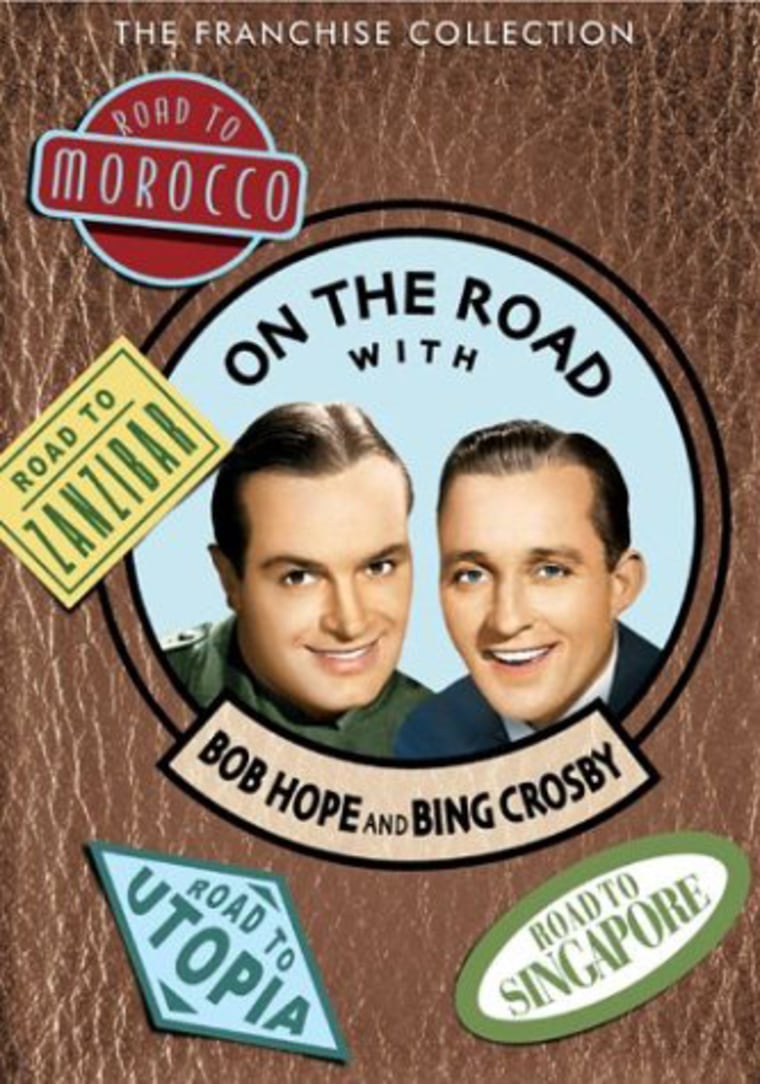
When you’re nine years old and find yourself singing, “Just like dictionaries, we’re Morocco bound” without really any idea of what that line means, does it say something about your upbringing? Well, if so, color me an odd child, because that line is from one of my all-time favorite movies, the Bob Hope-Bing Crosby classic “Road to Morocco” — just one of seven films the boys (along with Dorothy Lamour) did together. Yes, these movies have a formula. Hope is the hapless fool who thinks he’s more suave and attractive than he actually is. Crosby is the smart one, always ready to con Hope yet one more time, and equally ready to woo the ladies (usually Lamour) with one of his tunes. Yet, as square as it makes me feel to say so, these movies crack me up. The jokes work, Hope and Crosby have great chemistry, and you may just find yourself crooning “Moonlight Becomes You” along with Crosby. The two standouts of the series are “Morocco” and “The Road to Utopia,” in which Hope and Crosby pretend to be killers Sperry and McGurk, which leads to Hope snarling my favorite line: “Give me a lemonade…in a dirty glass.” The "Road" movies aren’t hip in any sense of the word, but they are darn funny. —Paige Newman
"The Champ" (1979 version)
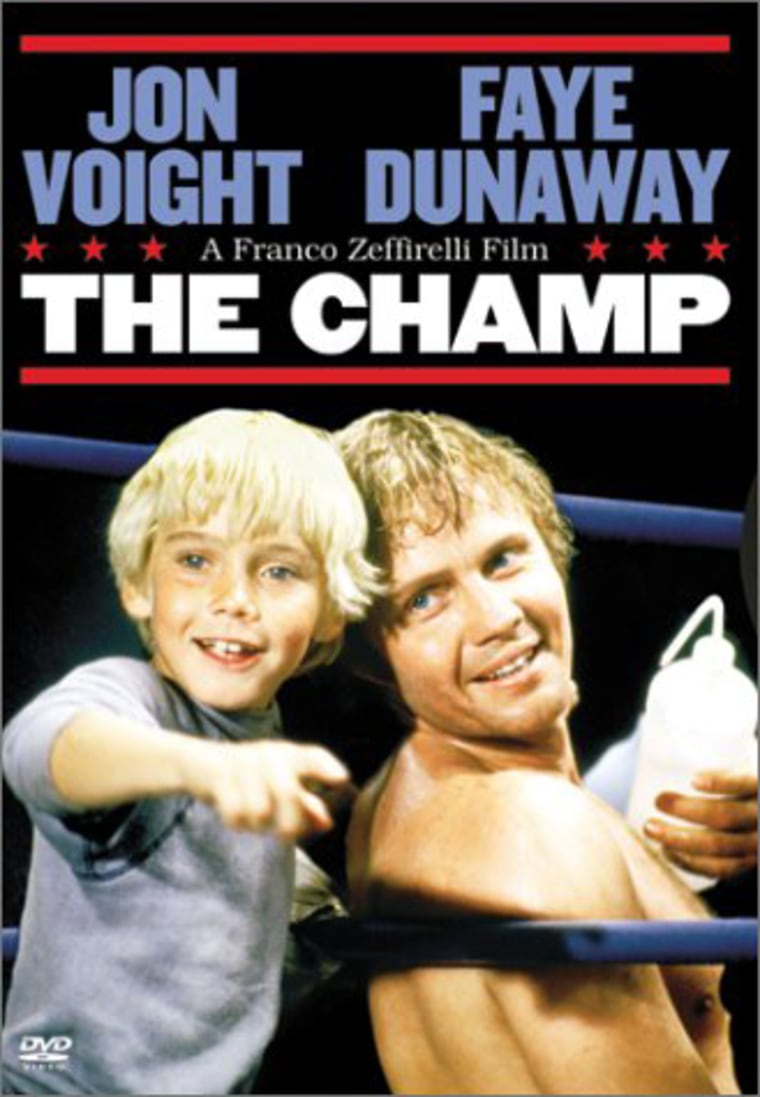
I know there’s a much better version of "The Champ" with Wallace Beery and Jackie Cooper, but because I first saw this film when I was 11 and cried like someone had stolen my new bicycle, Franco Zeffirelli’s 1979 version will always stay with me. Jon Voight plays Billy Flynn, a washed-up boxer who works as a horse trainer and raises his precocious son, T.J. (Ricky Schroder). When ex-wife Annie (Faye Dunaway) comes back into their lives, dripping of glamour and offering a better life for T.J., Flynn decides it’s time for one last fight. This film is so manipulative and sentimental that it makes Hallmark cards seem subtle, but when you hear little Ricky Schroder yelling, “Wake up, Champ!” I dare you not to cry. I can tune in for the last 10 minutes of this movie and still wind up bawling — and not an anti-depressant in the world would stop me. This movie is a three-tissue weep fest. It’s the kind of movie you’ll hate yourself for in the morning, and yet, still, if it happens to come on cable … you’ll be under its spell. —P.N.
Cheesy romantic comedies
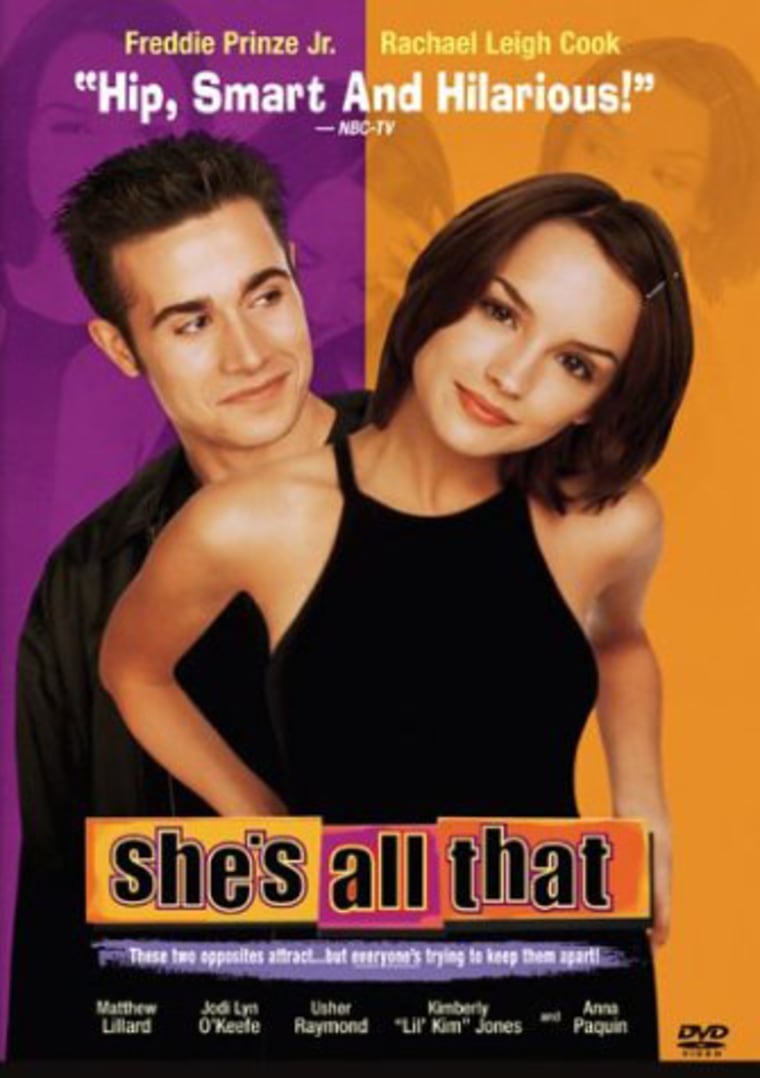
Don’t tell me I’m the only guy out there who likes chick flicks. Meaningful dialogue and cinematic quality aren’t requirements either. How adorable is Laney Boggs’ prom queen makeover in “She’s All That?” I’m still in love with Shannon Sossamon and the idea of meeting your soulmate in a laundry joint from “40 Days and 40 Nights.” Somehow, almost everything about “Down To You” with Freddie Prinze Jr. and Julia Stiles makes me shed tears like I was julienning onions in front of my face. It’s a little tough when the guys come by and want to check out the DVDs. After flipping past “Fight Club,” and “Ocean’s 11,” they get a little freaked out when they suddenly come across “Save the Last Dance” or “Felicity: Season 1.” I’m just a sucker for romance, corny or not, and intrigued by the process of falling in love. And for the record, guys can have heartstrings too. —J.J. Wright
‘The Cutting Edge’“The Cutting Edge” is not thought of as a guy movie, probably — and this is just a guess — because the plot centers around figure skating. I get ridiculed when I talk about it, much less quote from it (Try saying “Toepick!” when you see someone fall down — nobody will get the reference). It’s not a film that rests next to “The Godfather,” “Hoosiers” and “Rocky IV” in the Guys Film Canon. But here’s the thing ... it’s really not about skating at all. I don’t care what the promotional posters say, or what the actual athletic scenes focus on. This is the tough but inspirational — indeed, manly! — story of how an injured hockey player fights the odds and makes a success of himself in sports. OK, so that sport involves costumes with sequins, and moves that look suspiciously like dancing. And OK, fine, there’s the romance between the main characters that moves it dangerously close to chick-flick territory. Who cares? It’s a film about a hockey player — that’s my story, and I’m sticking to it. —Craig Berman
‘Drop Dead Fred’
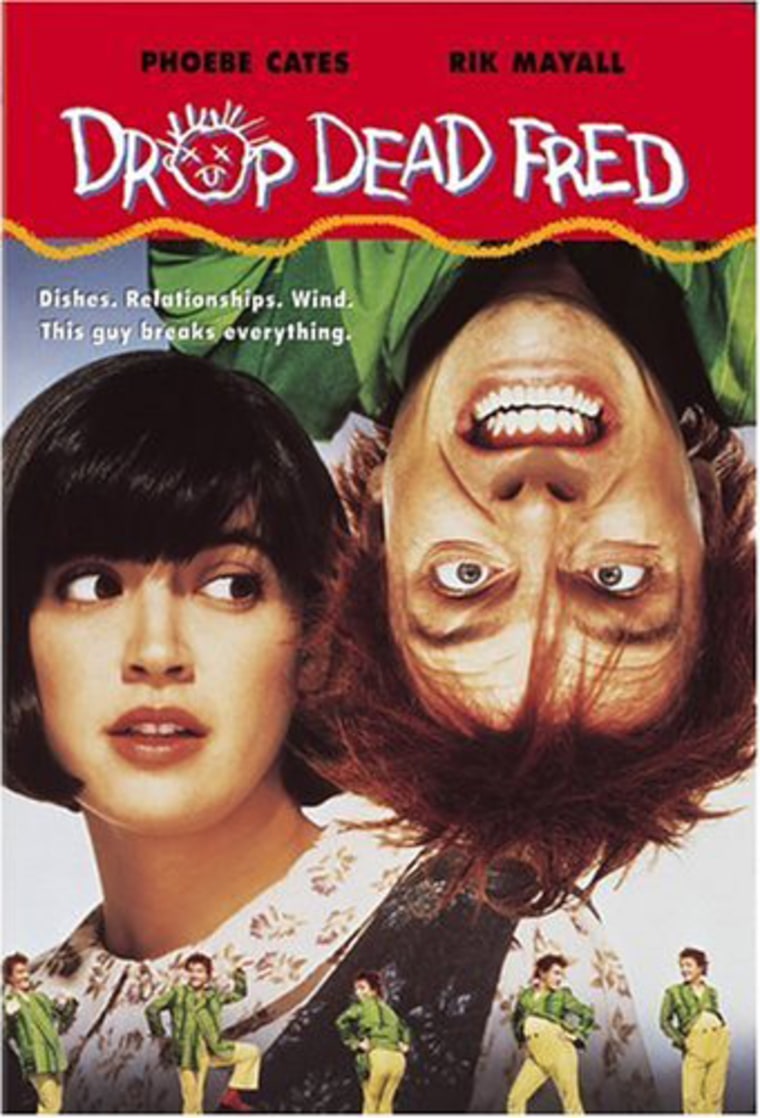
In 1991, Rik Mayall was known in the U.S. as the comical Anarchist in "The Young Ones", a Britcom shown on MTV. And Phoebe Cates was fresh out of her second run-in with little creatures in "Gremlins 2." So, when they were brought together in "Drop Dead Fred," the tale of a woman forcibly reunited with her childhood imaginary friend after twenty years, why wasn't it accepted as a wacky fantasy? Probably because the movie let the label of "imaginary friend" turn it into a psychological drama about the aftereffects of childhood trauma. But if you disregard the psychological red herring and accept Fred as not a chemical imbalance or defense mechanism, but as a guardian angel who breaks windows, flicks boogers and looks up dresses, the movie becomes a lot more fun. Then you can truly enjoy the construction of the world's greatest mud pie, the imaginary friend reunion in the psychiatrist's waiting room, Carrie Fisher as Cates' grown-up friend trying to strangle the invisible Fred, Ron Eldard as the guy you hope she'll end up with in the end buying into the craziness in a fancy restaurant and, of course, the sinking of the houseboat. And no psychiatric theory will ever explain how Fred becomes another little girl's imaginary friend at the end of the movie. Just remember: Drop Dead Fred and Peter Pan both wear green — only Fred's is more puke-green. —Wendell Wittler

How is it that I know every word to every song on the soundtrack of Disney’s least-loved animated feature, "Hercules"? Logically, this flick should be the worst of the worst: a big-budget family feature that floundered at the box office and has affirmatively not inspired a Broadway musical (although its Greek chorus of gospel-singing muses is awesome.) Megara, Hercules’ love interest, will never make the pantheon of revered Disney princesses, not with her sordid past and jaded attitude. Danny DeVito, Rip Torn, Bobcat Goldthwait, and Paul Shaffer all turn in wry, playful voice performances — but the jewel is James Woods as silver-tongued Hades, his hair a shock of blue flame that blazes ever-higher when he becomes enraged. Aside from such sight gags, much of the humor is slightly too sophisticated for little ones: a boy trapped in a rockslide shrieks “Somebody call IX I I!” Ultimately, it’s a Disney film that doesn’t pander to a Disney audience. It pokes fun at the excessive merchandising that is Walt's stock-in-trade. It depicts damned souls swimming in a river of death. It’s a brightly colored cartoon for sarcastic misanthropes, and that’s why I dig it. —Kim Rollins
William Zabka, King of the Jerks
In the 1980s, movie screens across the country were awash with the stories of 98-pound weaklings and frail, bookish nerds. And there to make life miserable for every single one of them was one man: William Zabka, King of the Jerks. With his shock of blond hair and snarky smirk, Zabka played the quintessential pretty-boy bully, awash in testosterone and, probably, Hai Karate. Best known for his turn as Cobra Kai Johnny Lawrence in “The Karate Kid,” Zabka sneered his way into the pop-culture pantheon as Ralph Macchio’s play-dirty arch-nemesis, sweeping Daniel-san’s injured leg during the climactic karate competition, and chasing him with his crew of skeleton-costume-wearing creeps. Zabka would have been cloaked in pure evil no matter what kind of outfit he wore, whether it was the red Speedo and caveman costume he donned while menacing Keith Gordon’s Jason Melon in “Back to School,” or the awesome table-lifting gloves he slipped into to terrorize nerds and loners in the cafeteria in “Just One of the Guys.” Where is he now? Believe it or not, cinema’s biggest bully was nominated for an Oscar in 2004 for “Most,” a film he produced and co-wrote. —Brian Bellmont
Post-movie bloopers
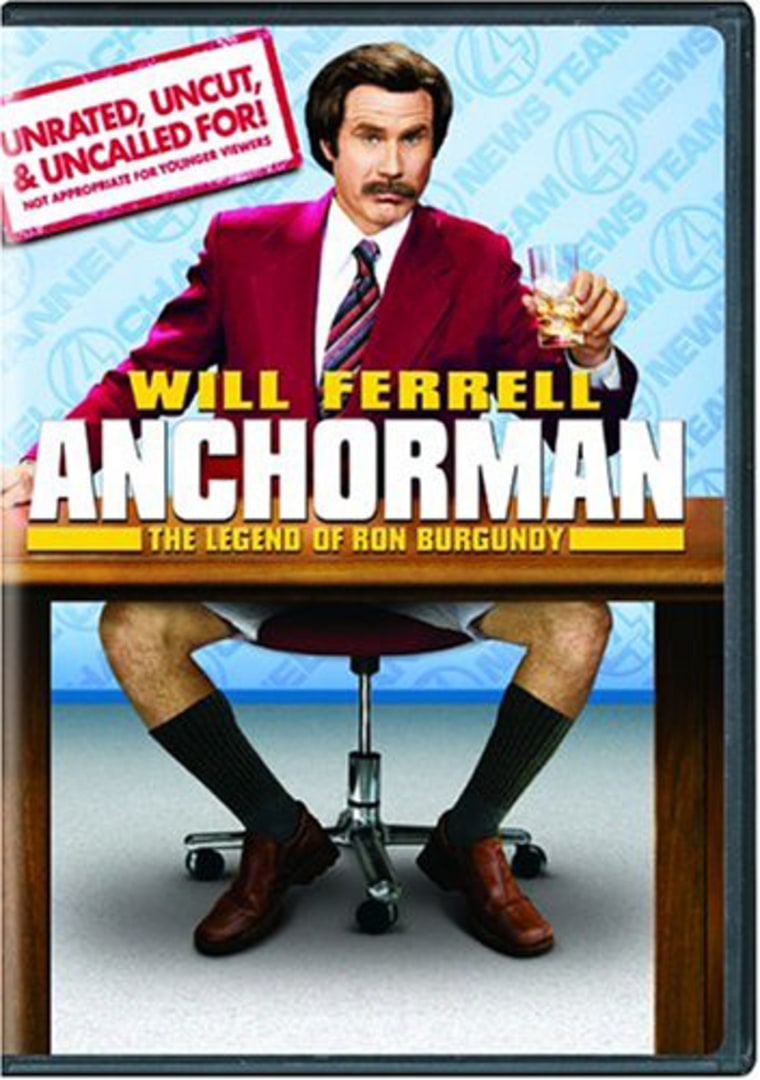
The public’s hunger for televised bloopers may have built additions onto Ed McMahon and Dick Clark’s mansions, but there’s still nothing like sitting in a darkened theater and watching goofs as the credits start to roll. “The Cannonball Run” and its ilk made the best use of post-flick flubs, with Burt Reynolds and Dom DeLuise goofing around while the credits crawled. Silly? Sure. But you’ve got to admit that seeing DeLuise laugh pants-peeingly hard certainly beats reading the names of the best boy and key grip. Thanks to Reynolds and crew, today’s audiences are conditioned to pause a bit after a movie, waiting to see if a few extra minutes of entertainment will unspool onto the screen. Disney/Pixar movies like “A Bug’s Life” and “Monsters Inc.” cleverly carried on the tradition with faux flubs. But it’s “Anchorman: The Legend of Ron Burgundy” that really delivered. Not only were bloopers by Will Ferrell, Christina Applegate and company hilarious, they snuck in an actual outtake from “Smokey and the Bandit II.” Now that’s old school. —B.B.
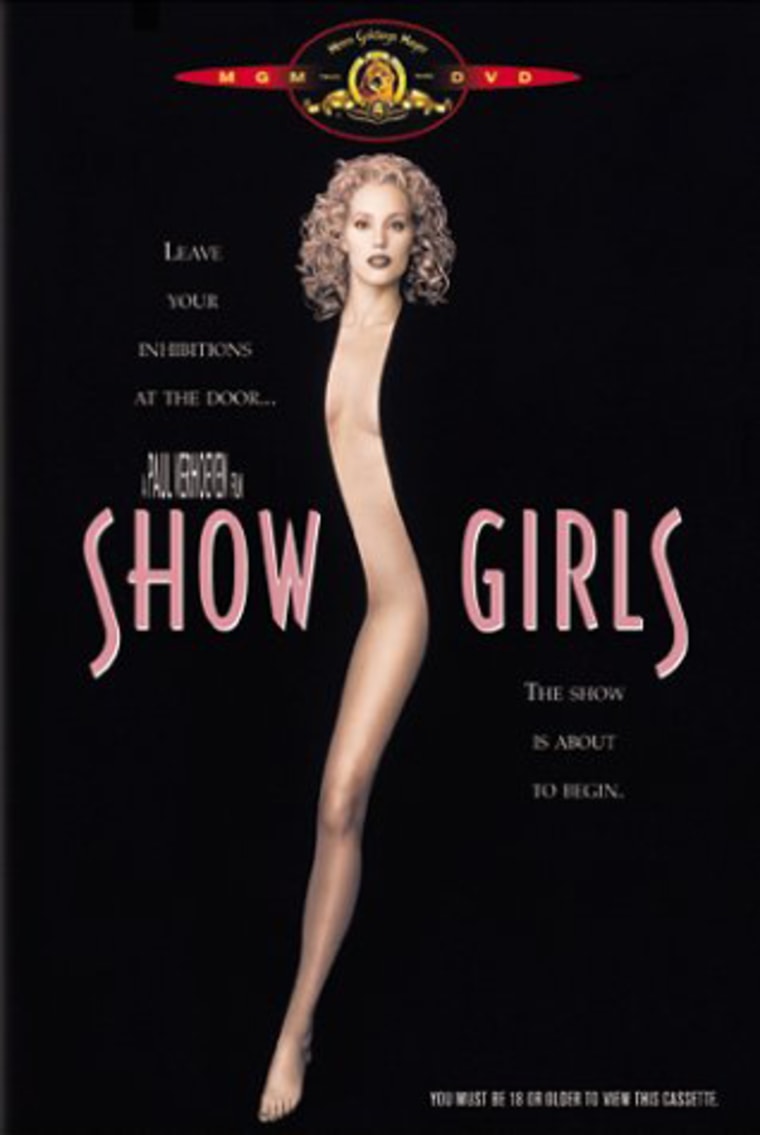
‘The Other Side of the Mountain’
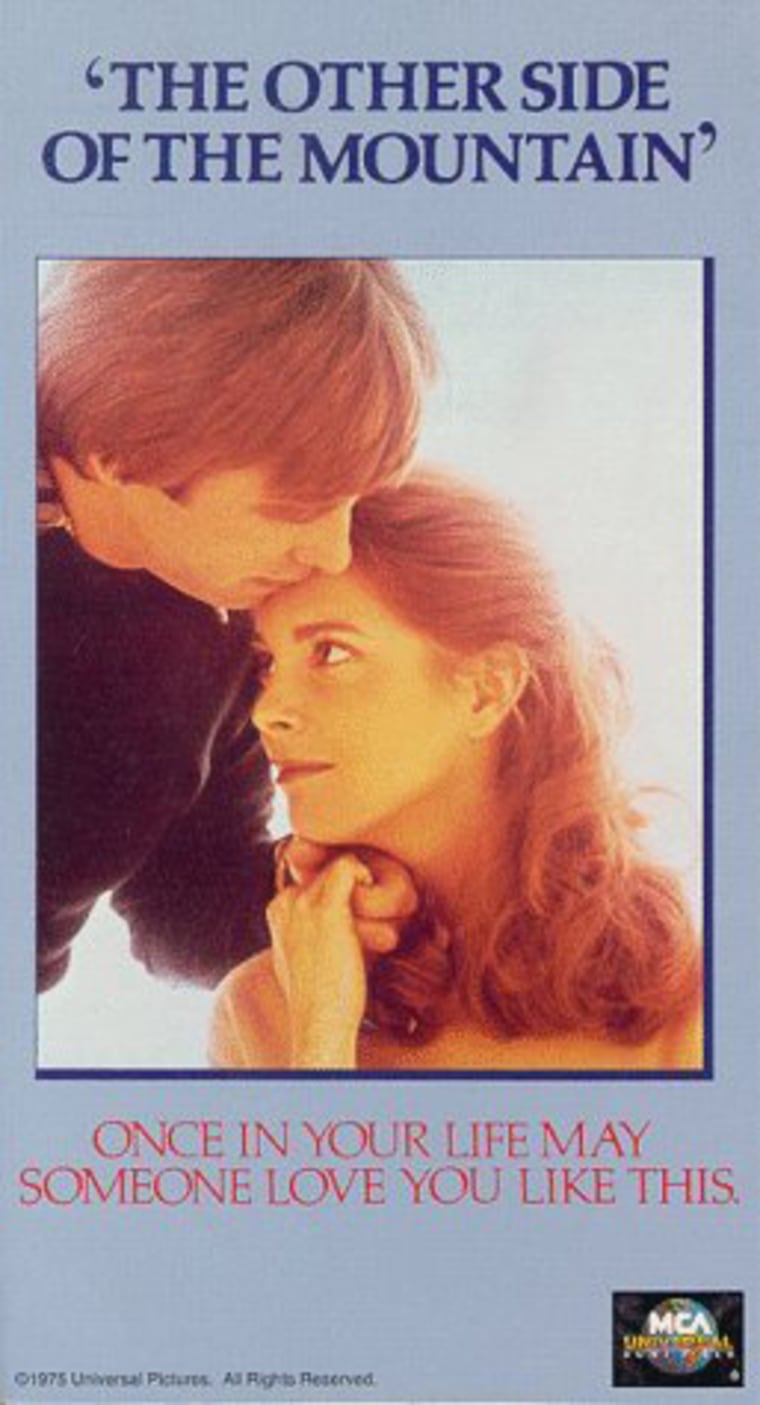
Before there was Lifetime television, before there was WE or Oxygen, there was a little film that stood as the pinnacle of the women-in-trauma movement. And that little film was “The Other Side of the Mountain,” which told the true story of Olympic skiing hopeful Jill Kinmont (Marilyn Hassett) who was paralyzed in a tragic skiing accident and learned to cope with her new life with the help of best friend — who also just happened to have polio — Audra Jo (Belinda Montgomery) and the tough love of the charming Dick “Mad Dog” Buek (Beau Bridges), a fellow skier and her first love. This movie is so hokey that even people who enjoy those Meredith Baxter-starring sobfests might find it a bit too tough to take, but, maybe because it was shown about a million times on TV when I was a kid, it just gets to me every time. The fate of Bridges’ Buek is almost too much to bear. It’s very hard to believe this classic isn't playing daily on of Lifetime. Get on that, people! —P.N.